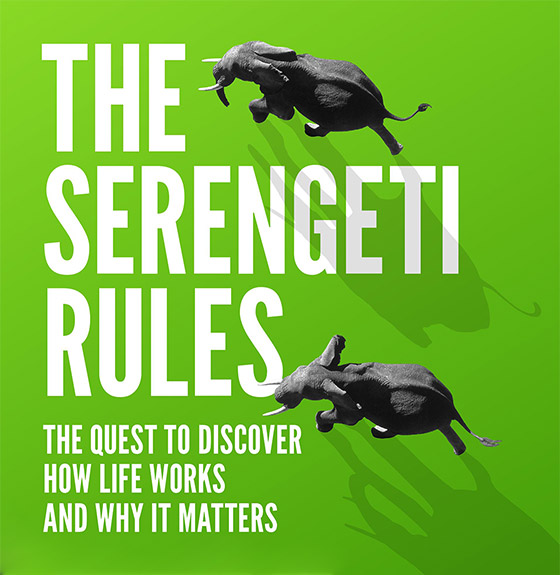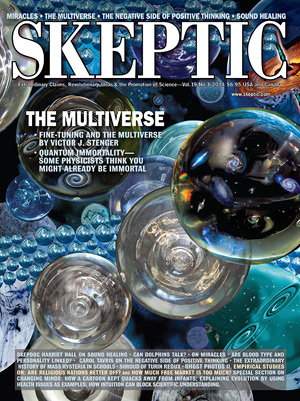In this week’s eSkeptic:
SCIENCE SALON MARCH 20
The Serengeti Rules: The Quest to Discover How Life Works and Why It Matters
9
How does life work? How does nature produce the right numbers of zebras and lions on the African savanna, or fish in the ocean? How do our bodies produce the right numbers of cells in our organs and bloodstream? In The Serengeti Rules, award-winning biologist and author Sean B. Carroll tells the stories of the pioneering scientists who sought the answers to such simple yet profoundly important questions, and shows how their discoveries matter for our health and the health of the planet we depend upon.
One of the most important revelations about the natural world is that everything is regulated—there are rules that regulate the amount of every molecule in our bodies and rules that govern the numbers of every animal and plant in the wild. And the most surprising revelation about the rules that regulate life at such different scales is that they are remarkably similar—there is a common underlying logic of life. Carroll recounts how our deep knowledge of the rules and logic of the human body has spurred the advent of revolutionary life-saving medicines, and makes the compelling case that it is now time to use the Serengeti Rules to heal our ailing planet. Order The Serengeti Rules from Amazon.
Call 1-626-794-3119 now to reserve.

Bad Clowns
SKEPTICALITY EPISODE 267
In this episode of Skepticality, Derek chats with author, investigator, and past guest on the show, Ben Radford, about his latest book: Bad Clowns. Clowns might not make the list of usual skeptical topics, but Ben thinks you might just change your mind once you delve into the history and stories in his new work. So, turn off the lights, snuggle your favorite creepy clown, and join in for some bad clown fun!
About this week’s feature
The oversimplified litany of alleged benefits of positive thinking is scientifically problematic. New research keeps whittling away at previously discussions of the benefits of positive psychology such that it is barely a shadow of its former hulking self. In this week’s eSkeptic, we present Carol Tavris’ column, “The Gadfly,” from Skeptic magazine 19.3 (2014) in which she examines the negative side of positive psychology.
Dr. Carol Tavris is a social psychologist and coauthor, with Elliot Aronson, of Mistakes were made (but not by ME). Order the book or the lecture on DVD.
The Negative Side of Positive Psychology
by Carol Tavris
In his book One Simple Idea: How Positive Thinking Reshaped Modern Life, Mitch Horowitz reports with pride how he responded to a task assigned to him by the teacher of a spiritual group. For a winter camping trip, he had to find heart-shaped pink buckets for the female campers who didn’t want to venture into the icy woods at night to urinate. Round wouldn’t do; red wouldn’t do. He searched for days, annoying his wife, who wondered why he didn’t expend the same energy on household tasks. And then, incredibly, he found exactly the right buckets at a neighborhood grocery store. The moral, he says, is that when you “endeavor past all conventional effort, to the point where giving up seems like the only possible option,” you get “an emotional charge that no actuarial table can fully capture.”
Your response to this story will probably predict your response to the positive-thinking movement in general. Are you thinking to yourself, “Talk about bucket lists! What a charming account of positive thinking and persistence in the face of unlikely success!” Or are you thinking, “Did anyone think about the female campers’ reaction to being given a stupid heart-shaped pink bucket? ‘Thanks, Mitch, but I’ll just use my pee shooter so I don’t have to smell a bucket of urine all night or knock it over when I stumble out in the morning.’ How about those household tasks he wasn’t doing—did his wife tell him to, well, piss off?”
Over the years I have grown quite grumpy about positive thinking. I don’t object to it as a general life strategy, of course; but the oversimplified litany of alleged benefits it produces is scientifically problematic. Over the years of constantly updating an introductory psychology textbook with my coauthor Carole Wade, new research obliges us to keep whittling away our previous discussions of positive psychology’s benefits. In our latest edition, positive psychology is barely a shadow of its former hulking self. […]

HELP SUPPORT OUR EFFORTS
Donate via PayPal and eBay
Did you know that you can support the work of the Skeptics Society by donating to us via PayPal or eBay? You can make a donation to the Skeptics Society via the PayPal Giving Fund, or favourite us on eBay Giving Works, and specify the percentage of your eBay sales that you’d like to donate to us. Your donations directly support the work of your Skeptics Society.
















